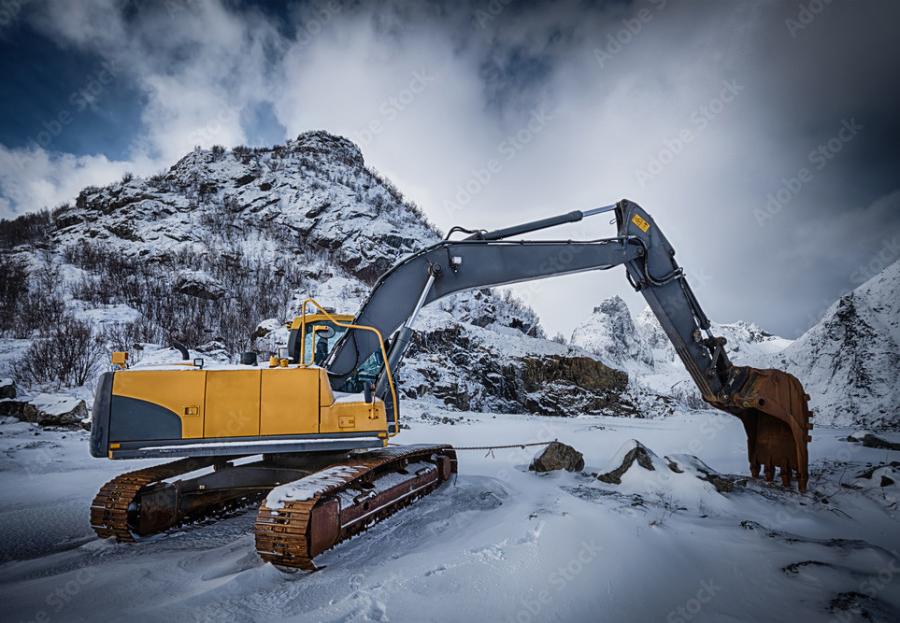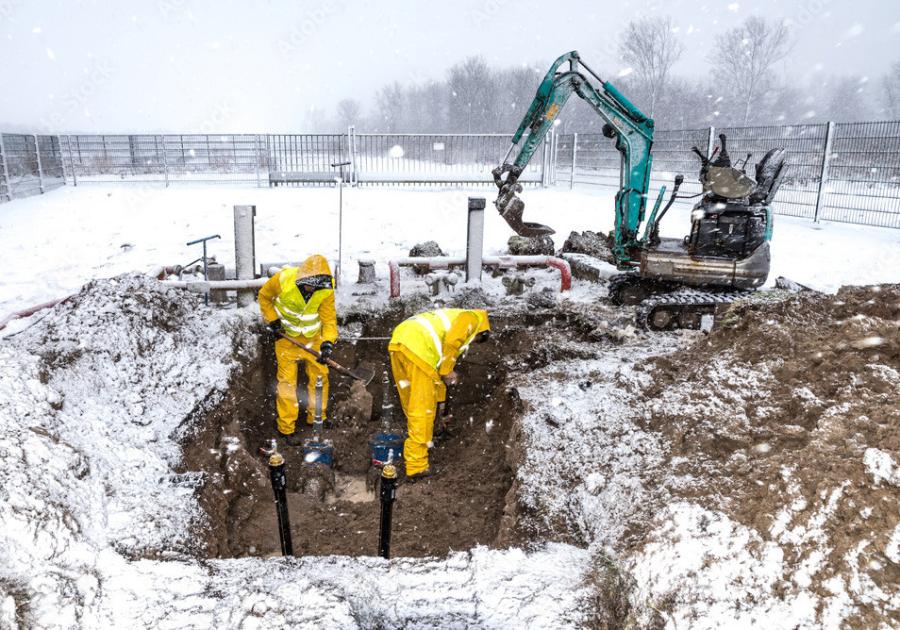Neglecting to winterize equipment has dire consequences. Properly winterizing your entire fleet for either long-term storage or use through the winter is critical.
Is your construction fleet ready for winter? As cold weather arrives, it's critical that your heavy machinery runs when you want it to, even if that's not until the weather turns warm again. Will you operate your equipment through the colder months, or will you store it for the winter? That will dictate how you winterize it.
Ice can build up quickly in cold, wet weather. Failing to take precautions to prevent the destruction of equipment from extreme elements can cost you in parts replacement and down time when your equipment won't fire up.
Preparing your fleet for extreme temps can be a complicated process, and sometimes it's best left to a professional. A local service provider with a certified technician on staff will make sure proper fluids are used and at the correct levels, points out Fairchild Equipment.
"Take advantage of the service technician's equipment inspections to check the machine for other issues that can be serviced on a single visit," said the Green Bay, Wis., material handling equipment dealer.
Fairchild also suggests working with a provider that offers road service. If bringing equipment into the local shop isn't an option, road service is a convenient alternative for you and will prove less disruptive to your operation.
Worst-Case Scenarios
As heavy machinery sales and rental company Wheeler Cat points out, not winterizing your equipment has several dire consequences, depending on how much the preparation lacked.
"Don't let these scenarios apply to your fleet. Properly winterize all your equipment for either long-term storage or use through the winter."
Covered areas protect your heavy equipment from damaging snow, ice and freezing weather. So, it's best practice to keep your machinery protected from the elements whether you intend to use it over the winter or not.
"If you park your equipment outside, you may find yourself needing to dig the vehicles out of snow banks," suggested a winterization blog post by Wheeler, based in West Valley City, Utah.
Something as simple as not changing the oil also can affect your heavy machine during colder months. Oil does not last forever, said the company.
"Forget the myth you may have learned that oil cannot wear out. It can. And if you continue to use dirty oil, it will not lubricate your engine as well."
Plus, if you use a high viscosity oil in freezing weather, it will move too slowly and draw more power from the engine, making starting harder and wearing your engine's components.
Not completely warming your equipment's engine? Beware: Diesel engines should not be operated while still cold, especially in the winter, warned the Cat dealer. Failing to wait for the engine to properly warm to operating temperatures could cause the exhaust valve or the intake to stick.
Ice crystals, formed from moisture in the air, can prop open your tire valves when you don't fill your tires with dry nitrogen. Wheeler noted that an open valve will cause your tire pressure to drop.
Also, regular air will lose pressure in freezing temperatures more readily than dry nitrogen.
"Tires with low pressure reduce fuel efficiency by making the engine work harder," according to Wheeler's blog.
If you don't correctly lubricate moving parts before the winter, rust can infiltrate immobile parts on your machine. Save your equipment and avoid headaches by properly winterizing your heavy equipment, the blog urged. It's a "significant" undertaking, and one that might require professional help, said Wheeler.
Beating the Winter Blues
There are simple steps you can take to keep both your heavy and compact machinery in working order through the winter and back into the warmer months. Winterizing starts with a thorough inspection of the machinery.
Tending to multiple systems is part of the process, noted Wheeler, and how you prepare the equipment will depend on whether you will use it or store it before the spring.
"Though the steps needed to ready equipment for storage and use over the winter differ slightly, both processes are critical for maintaining your company's heavy equipment," said the equipment sales and rental company.
If your company does not operate during the winter, your fleet will need to be prepped for storage. Wheeler Cat pointed out that long-term storage in the cold can be just as harmful to your heavy machinery as using it during the winter.
Remove any attachments from the equipment for storage in a separate place at room temperature. Lubricate the accessories and the machinery if they haven't already been treated.
"A high-viscosity lubricant will not drip off your equipment in the cold, and it will coat the parts better than a low-viscosity grease," according to the blog post
Blue Diamond Machinery suggested that contractors should "watch that your tires don't freeze to the ground, as this can result in tears and drive train damage."
You can prevent this from happening by parking your machinery on raised planks, Reannon Muth wrote in a Blue Diamond blog on winterizing heavy equipment. "We also recommend that you keep buckets and blades on raised surfaces as well."
Next, drain all liquids from the engine, including the fuel. Removing the fuel with the engine running ensures you get all the diesel out. Wheeler also suggested removing the battery and storing it at room temperature to keep it from losing its charge.
"If any systems in your heavy equipment store water or fluid, drain those and dry them thoroughly to keep the storage tanks from freezing."
Place a tag clearly labeling each machine as stored and not ready for use, said Wheeler. The labels will prevent someone from inadvertently attempting to take the equipment out before it's prepared for warmer weather.
Cover the equipment, if you have covering, to protect the machinery from dust and scrapes during the winter. Something as simple as a tarp covering the vehicles will keep the temperatures slightly warmer, adding further protection from the cold, said the Cat dealer.
Working Through the Cold
If you are operating your heavy equipment during the winter season, "you'll need to exchange a one-time pre-season maintenance with daily and weekly tasks," said Wheeler.
"Freezing weather and ice can take their toll on the diesel engines in your heavy equipment. If you don't care for your machinery daily, you could pay to replace the vehicles instead. A small amount of prevention will go a long way toward keeping your business running."
Blue Diamond suggested operators check heaters and defrosters before cold weather hits. If you wait until winter to check your atmospheric system, you may find yourself in for an unpleasant surprise, Muth wrote.
Make sure your operator confirms that "compartment heaters and defrosters are in working order before the first days of fall and make any needed repairs ahead of time," she said.
Wheeler suggested that during winter, on a daily basis, operators should check the following:
Battery: If the temperatures freeze in the storage area, remove the battery and keep it at room temperature to prevent draining it excessively. A warm battery operates much better than a cold one.
When temperatures drop below freezing, it's vital you check your batteries, wires and hoses to verify they haven't frozen or become stressed due to the frigid temperatures, urged Blue Diamond.
Not only will a frozen battery not function, but it's also likely to explode if you attempt to charge it or jump start your equipment with it, according to the dealer.
"What's more, hoses and wires can become brittle in the cold. To prevent permanent damage, give your equipment ample time to warm up before operating."
Engine starting: Use an engine warmer to warm the engine. The warmer will thaw out the engine block and make it easier to start. Starter fluid will help even more. Before beginning operation, run the engine until it reaches its full operating temperature.
Never operate your equipment while the engine is still cold, or the exhaust or intake valves could stick.
Air intake: At the end of the day, always check the intake for snow or ice, said Wheeler. In storage, the snow and ice can melt and later refreeze if taken back out.
Tires: Clear off snow or ice from the equipment's tires and park it on planks to prevent the tires from freezing to the ground. And check the tire pressure regularly. If the pressure drops, use dry nitrogen to refill the tires.
Fuel: Refill the fuel tank at the end of each day. A full tank has less likelihood of producing ice in it than a partially filled one, according to the blog post. Also, switch to diesel for lower temperatures. Depending on how cold it gets where you operate your equipment, you may need to change from 2-D to 1-D diesel fuel or use additives.
"Failing to switch to cold-weather fuel could cause the diesel to gel in the lines, clogging the fuel system and preventing operation," warned Wheeler. Empty the water separator to keep the water from freezing and causing damage.
When fueling your equipment, be careful to ensure that water and contaminants don't enter your fuel tank, said Blue Diamond. "This happens more commonly during the colder months, so you need to pay careful attention to prevent engine contamination."
Antifreeze: Wintry weather requires antifreeze capable of handling the lowest predicted temperatures. Wait until after the engine cools entirely before putting antifreeze in your machinery.
Rubber components: Because rubber parts can dry out quickly and crack in the cold, you should assess the rubber parts of your equipment as part of your weekly maintenance regimen during the winter.
Oil: Ensure proper viscosity and easier starting by switching to a synthetic oil during the winter, urged Wheeler. Though slightly more expensive than conventional oils, synthetic offers better operation in the cold. "Use a multi-blend or fully synthetic oil such as a 5W-40."
The 5W offers proper viscosity at lower temperatures compared to a 15W oil, and the W stands for "winter" in the oil grade. In the winter, lower viscosity oils flow easier and put less strain on your engine during cold starting.
Exterior: Wheeler also noted that road salts can corrode the paint and components of your heavy equipment. When you park the machines at the end of the day, rinse off any dirt and salt.
Frost, ice and frozen ground can make digging more difficult during the winter. This can put a strain on your machinery, according to Blue Diamond. "Keep an eye on your equipment to ensure the machine's components are working properly and keep production to a minimum, if possible," said the heavy equipment provider.
Preparing before the cold weather arrives is critical to preventing costly damages in the future. It also makes the most of your crew's time during the winter months. CEG
Today's top stories























